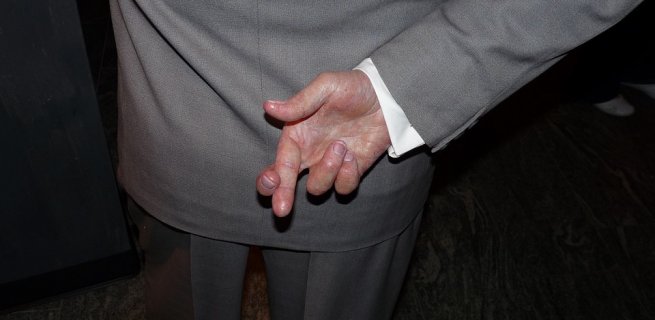Perjury is, put simply, lying in court, and is a very serious offence in NSW. It can be either verbal or written and comes with a 10 year prison sentence, according to the Crimes Act, which is five times longer than the maximum penalty for either common assault or theft.
Anytime you have to give evidence in court, you will have to swear an oath or give an affirmation that you will tell the truth.
But the law deals with dishonesty in the courtroom very severely – anyone who makes a false statement knowingly, or says something they believe is not true, in connection with any judicial proceeding is guilty of perjury.
This includes things even said before a trial has commenced and can be committed by a suspect, or a witness, or anyone else, even police.
Six policemen got caught out recently, after their evidence following a violent arrest was contradicted by CCTV footage which cast considerable doubt over their story. The footage was initially thought to be damaged but it worked well enough when the Magistrate viewed it.
The officers had claimed that Corey Barker, the man arrested on the night, had hit an officer when the reverse was true.
The police wrestled him to the ground, and kicked him in the head. He was then dragged along the floor on his stomach and kept handcuffed in a cell for over an hour.
The charges against Barker, unsurprisingly, were thrown out of court and now the police are the ones who will be appearing before court.
They will all be facing Downing Centre Local Court on an array of charges including perjury, assault, perverting the course of justice and fabricating evidence.
But perjury in NSW is not often prosecuted – and perhaps this is because it can be difficult to prove. According to the NSW Police Handbook, a person can only be convicted of perjury in two ways:
- If they confess to it; or
- If their evidence is proved false by two witnesses or one with corroboration
Marcus Einfield is another person who has been disgraced before the Courts
Situations where perjury may get tricky is if a barrister finds out that their client has committed perjury – while he or she does not have to tell the court, a barrister in this situation can no longer act for their client.
There are some defences to perjury – duress may be a sufficient excuse but the boundaries of this defence are pretty narrow.
Duress is defined as a present and immediate threat, taking place at the time that the crime (perjury) is taking place. It needs to be of such an extent that the will of the individual is overborne to the extent that it can no longer be said that they are acting voluntarily.
In one old case that remains good law in Australia, one of the two teenaged girls who witnessed a fight was threatened by the accused. They told her that if she identified the men in court, they would get her and cut her up. Perhaps not surprisingly, both teenage girls claimed in court not to recognise either of the accused.
While the case was successfully appealed on a procedural matter, the court of appeal held that if you have time to think about committing a crime, an interval before the threat and committing the offence, duress can no longer have been said to take place.
A defence of duress is not likely to be your best bet in this case. However it is also possible to raise a defence if you honestly believed what you were saying was true, or misunderstood the question being asked.
So if you have to face a NSW court soon, either answering to charges or as a witness, being honest in court is really the best thing to do because being caught out lying could end up landing you in a lot of trouble.











